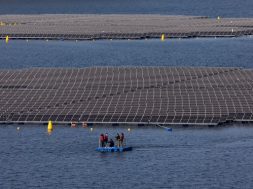
Bengaluru: Taking cue from Prime Minster Narendra Modi’s ardent appeal in Paris Climate Conference in 2015 to make India a solar-powered nation, the Karnataka Electricity Regulatory Commission (KERC) has taken an initiative to provide a predictable long-tem tariff for renewable energy projects.During the Conference, India set an ambitious target of achieving 100 gigawatt solar power by 2022, hence the state governments are working in tandem to fulfil this vision.
In lieu of this, the KERC organised hearings, during which The Green Power Market Development Group (GPMDG), proposed a long term policy framework that provides for fixed wheeling charges.Apart from this, the KERC has included cross-subsidy charges on solar power from solar farms. Additionally, it has given a 10-year waiver of key grid charges, for solar power projects commissioned before March 2018.
The exemption of these charges enable solar developers to provide power at very competitive rates, as Karnataka has recently witnessed with an average hike in grid tariff rates by 8 percent.With the current tariffs being Rs. 6.90 for industrial consumers and Rs. 8.50 for commercial users, solar power available to corporates today would be 30 to 40 percent cheaper.
At least Rs. 2 per unit of power could be saved, thereby helping corporate entities and institutional clients to achieve significant savings on electricity bills and help them become more sustainable.The favourable policy has enabled large corporates to buy significant proportion of their power from solar farms, at a significant discount to grid power costs, under long-term contracts with solar developers.
A prime example of the success of the scheme is the works done by CleanMax Solar in the region. CleanMax Solar operates on a unique OPEX/zero investment/pay as you go model, in which solar developers provide 100 percent of the investment in solar power plants, and sell power to large consumers under long-term Power Purchase Agreements.This has made solar contracts available to corporates and large financially strong power consumers at rates cheaper than conventional sources of energy.
Andrew Hines, co-founder of CleanMax Solar said, “The Karnataka solar policy really began paying dividends for the state just over a year ago, when CleanMax Solar commissioned the first solar farm under the policy. We have already contracted more than ten large off takers in the state – IT companies, industries, 5-star hotels – which are saving on their energy bills through long-term contracts with us. This has also been beneficial to the state, which has seen significant solar capacity coming online, which brings needed power to the state and increases the proportion of clean energy here.”
One of CleanMax Solar’s most significant clients includes technology services company Mindtree Limited. The company has availed 2 megawatt from the CleanMax Solar’s solar park, which meets 75 per cent of their energy requirements for their Whitefield office and impacts the environment with about 2832 tonnes of CO2 abetted annually.
Senior Project Associate, World Resources Institute, Thanikonda, praised the Karnataka model saying “The waiver of key grid usage charges for the first 10 years of project life in Karnataka makes solar power an attractive proposition to large electricity consumers. Under this policy, so far, projects to the tune of 120 MW capacity are installed both under Capex and Opex models. The policy has served KERC’s intent of encouraging the deployment of critical mass of projects that can then lead to greater scale up of solar power in the state.”
He also stressed that these costs need to be balanced out so that private investments flow in and help the country scale up its renewable energy deployment.Andrew Hines said: “With the policy coming to an end in March 2018, the landed cost of solar power from new projects would jump by 40-50%, wiping out most or all of the savings for consumers. Given that developers need roughly 6 months to set up a project, consumers in Karnataka really only have until September to contract for solar supplies under this policy to avail the current waiver.”
Ashok Thanikonda opined that post March 2018, Karnataka can continue its leadership in renewable energy space, by fixing reasonable and appropriate grid usage charges that are predictable over long term. The decline in the costs of renewable energy means, it will be competitive despite some grid usage charges – resulting in a win-win solution for all the stakeholders.At present, Karnataka is the only state to provide such lucrative proposition for solar power adoption, where the state government acts as a major facilitator to bridge the energy demand supply gap, and for the prime minister’s vision to materialise, more states need to follow suit.
Source: ANI













